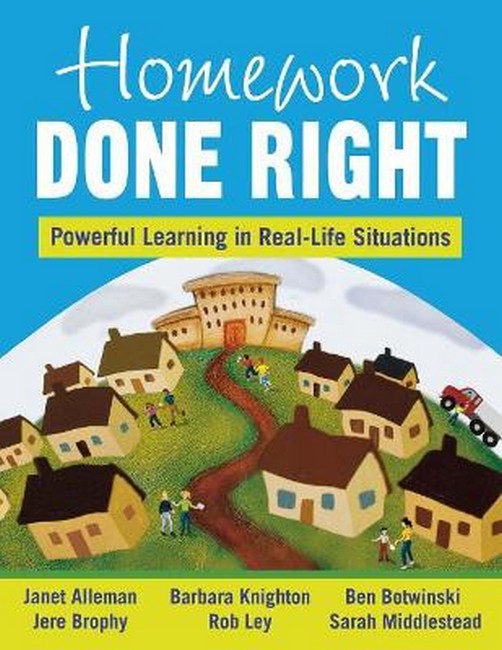Janet Alleman is a Professor in the Department of Teacher Education at Michigan State University. She is author and coauthor of a range of publications including Children's Thinking about Cultural Universals and a three-volume series entitled Social Studies Excursions, K-3. In addition to serving on a host of committees at the state and national levels, she has been a classroom and television teacher, actively working in school settings, and has taught at over a dozen international sites. Jere Brophy was a University Distinguished Professor of Teacher Education and Educational Psychology at Michigan State University. A clinical and developmental psychologist by training, he conducted research on teachers' achievement expectations and related self-fulfilling prophecy effects, teachers' attitudes toward individual students and the dynamics of teacher-student relationships, students' personal characteristics and their effects on teachers, relationships between classroom processes and student achievement, teachers' strategies for managing classrooms and coping with problem students, and teachers' strategies for motivating students to learn. Most recently, he focused on curricular content and instructional method issues involved in teaching social studies for understanding, appreciation, and life application. Barbara Knighton is an elementary school teacher with over 20 years of experience in the classroom, including 16 years concentrating on the early grades. She currently teaches fourth grade in the Waverly Community Schools in Lansing, Michigan. Barbara has coauthored or contributed to several books on education, including two with an in-depth look at teaching in the primary classroom. Rob Ley has taught third and fourth grade in both urban and suburban districts. He received his BA and MA from Michigan State University and is currently teaching in the Haslett Public Schools in Haslett, Michigan. He has presented research at state and national conferences related to making curriculum more meaningful for students by integrating community resources. He also directs an enrichment cluster learning context that focuses on creating a time and place for real-world, student-driven learning. Outside the classroom, he leads hiking and cycling adventures in various locations throughout the world. Benjamin Botwinski is currently enrolled as a full-time graduate student at the College of Education, Michigan State University, where he is studying educational policy and administration. Prior to becoming a full-time student, Botwinski served as a high school social studies teacher in west Michigan. He currently lives in East Lansing, Michigan, with his wife and two children. Sarah C. Middlestead is a middle school teacher with seven years of experience in the mathematics classroom. She obtained both her undergraduate and graduate degrees at Michigan State University and spent the first seven years of her teaching career at at a middle school in mid-Michigan. Sarah is passionate about teaching mathematics in an innovative and creative way, guiding students in exploring how mathematics is used in the world in which they live. She is currently enjoying time at home with her two young children while tutoring and writing.
Request Academic Copy
Please copy the ISBN for submitting review copy form
Description
List of Tables and Figures Preface Acknowledgments About the Authors 1. Introduction: What Is so Important About Homework? Part I. Realize the Purpose 2. What Is the Rationale for Homework? 3. What Do the Experts Say about Homework? 4. How Does Changing Homework Impact Your Practice? Part II. Assemble the Plan 5. How Can You Design Meaningful Homework? 6. How Can You Put Meaningful Homework into Action? Part III. Examine the Possibilities 7. How Can Meaningful Homework Look in the Early Elementary Grades? 8. How Can Meaningful Homework Look in the Upper Elementary Grades? 9. How Can Meaningful Homework Look in Middle School? 10. How Can Meaningful Homework Look in High School? 11. Still Not Convinced? Appendix A Appendix B Appendix C Appendix D Appendix E A Guide to Your Professional Learning References Index
"Homework Done Right takes a fresh look at how to create homework assignments that students will be motivated to complete, not based on the grade alone, but on the real-life applications of the assignments. I have already begun using the information presented in this text to tweak existing assignments to make them more intellectually rewarding for my students!" -- Jessica Purcell, Science Teacher "The topic of homework is an important discussion for educators to be having in this age of increased competition and higher standards. What is the best way to extend learning for students of all ages? This book, based on a set of beliefs about teaching and learning, manages to address this topic in a well-considered and carefully researched format that will be useful to educators who are looking to improve their results with students." -- Mary Johnstone, Principal "The book caused me to reevaluate my own homework assignments in a new light and begin to think about what I can do to get my own homework 'done right'!" -- Sally Koczan, Science Teacher "Just like their students, modern teachers want to know how what they learn is going to help them. Homework Done Right shows readers exactly why meaningful homework is best for students and provides teachers with answers to those perennial student questions: 'Why do we need to know that?' and 'When am I ever going to use this?'" -- Tim Tharrington, Sixth-Grade English teacher

